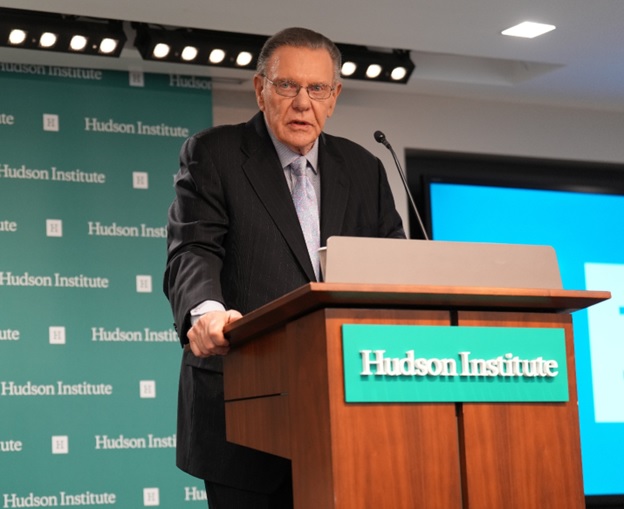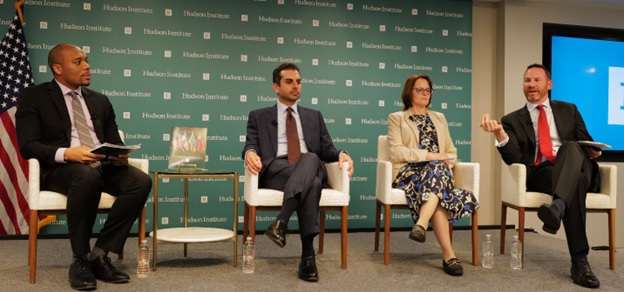

Gen (ret) John “Jack” Keane

Members of the panel
Hudson Institute Spotlights Afghanistan
By Elaine Pasquini
Photos by Phil Pasquini
Washington: While news on Afghanistan is currently not in the headlines, “Afghanistan is still of national security interest to the United States,” said moderator Jeremy Hunt in welcoming remarks at the Hudson Institute on April 21, 2025, “but it’s an important and vital piece of our security in the United States. This program will shine a light on the situation there.”
The first speaker, Army Gen (ret) John “Jack” Keane, chairman of the Institute for the Study of War, argued that the potential security threats the United States is facing today from China, Russia, Iran and North Korea emanate from the chaotic withdrawal of all US troops from Afghanistan in August of 2021.
“The decision to unconditionally withdraw US capabilities from Afghanistan by September 1, 2021, was a major geopolitical event that not only led to the Taliban taking over control of Afghanistan and the rise of terrorism today, but it also incentivized our adversaries to become more aggressive as they saw weakness in that US decision,” Keane said. “They came to believe that United States’ leadership displayed by that decision is weak and that the United States lacks the political will to confront them. They concluded that this was the beginning of the decline of the United States’ world leadership.”
And he pointed out, Russia would invade Ukraine six months later. “Perception of US weakness is real, and they acted upon it.”
The US only had some 2,500 troops assisted by US airpower, which also supported the Afghan security forces. In addition, six other NATO nations had 7,000 troops there. Maintaining even this small presence would have provided Afghanistan with security from threats not only from the Taliban, but al-Qaeda and the Islamic State Khorasan Province (IS-KP), he opined.
Ali Maisam Nazary, head of foreign relations for the National Resistance Front of Afghanistan (NRF), the only real opposition to the Taliban, said the issue of Afghanistan is important to the United States because “it’s connected to our security, well-being and interests.”
For the past year, the NRF has drastically increased operations and expanded in all directions within Afghanistan. “From 2024 up until today, there have been more than 400 operations in around 20 provinces, including Kunduz, Kabul and western Afghanistan as well,” he stated.
One success for the NRF over the past three years was its ability to sustain and expand its resistance without any external support. “We’ve proven our will; we’ve proven our determination and competence…and we’ve proven we can expand without anyone supporting us despite so many hostilities towards us in that region – something that many questioned in the beginning,” he noted.
With fractures developing within the Taliban, “Afghanistan is on the course of a power vacuum, which can be both an opportunity and a challenge,” Nazary related. “It’s a challenge if the international community, especially the United States, keeps ignoring the democratic forces in Afghanistan especially the National Resistance Front of Afghanistan that has been doing a good job.”
Lisa Curtis, senior fellow and director of the Indo-Pacific Security Program at the Center for New American Security and former senior director for South and Central Asia at the US National Security Council, noted that former president Biden did not have to abide by the Trump administration’s 2020 Doha Accord. “He could have negotiated a new agreement” for withdrawal of US forces from Afghanistan, she said.
Curtis also leveled strong criticism against the present administration for recently emailing Afghans living in the United States under temporary protection status instructing them to self-deport in one week, saying that they are “no longer welcome in the United States.”
These were Afghans, she pointed out, who supported the US mission as interpreters or who helped with logistics or fought alongside US forces. After the chaotic withdrawal, many US veterans had stepped up to help their Afghan colleagues leave Afghanistan safely and start new lives in the United States.
To see the administration deporting Afghans back to a Taliban-controlled country is really egregious, she said, especially for women and girls who basically are denied all human rights, specifically the opportunity to attend schools and universities and to work.
“Educating women and girls in Afghanistan would protect US national security,” she said. “The Taliban’s severe repression of women only strengthens the Taliban’s totalitarian grip on the entire Afghan population.”
Lastly, Hudson Institute senior fellow Luke Coffey pointed out that on September 11, 2021, the Taliban were controlling a larger area of Afghanistan than it was 20 years earlier. “This is a dire consequence of the actions taken by President Biden. Now, Afghanistan has become a complete blind spot for us in terms of awareness and our counterterrorism efforts,” he lamented.
Apart from counterterrorism challenges, Coffey insisted that Afghanistan still matters because of the country’s location in the heart of the Eurasian landmass, bordered by Iran, Pakistan – near Russia and China, encompassing a massive percentage of the world’s population.
Coffey also called attention to the large number of weapons – about $7 billion worth – which the United States left behind in Afghanistan that have surfaced in the black markets of Central and South America.
On a final note, he suggested that the US should start directly engaging with the NRF. “We should elevate our engagement with the Vienna Process, a diplomatic tract which brings Afghans from different community and ethnic groups to Vienna twice a year to share a common platform on how they can better coordinate their response to the Taliban.”
(Elaine Pasquini is a freelance journalist. Her reports appear in the Washington Report on Middle East Affairs and Nuze.Ink.)

